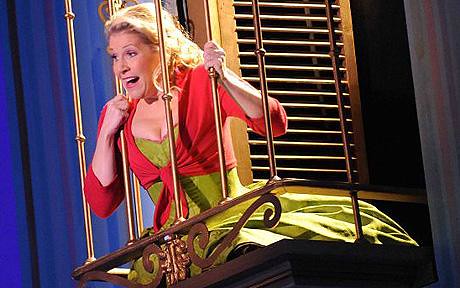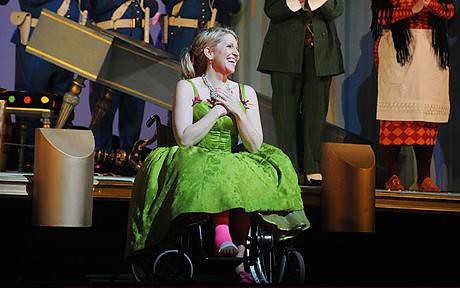«But it's the five principals who make the show unforgettable. Each one is a star, and they combine in a team of friendly rivals who knock sparks off each other. Juan Diego Florez was in top form as Almaviva, bringing the house down with an electrifying account of the usually omitted virtuoso aria 'Cessa di piu resistere'. Pietro Spagnoli made his house debut as the most amiably spunky, earthy and bumptious of Figaros, while Alessandro Corbelli presented a beautifully detailed, understated Bartolo, in brilliant contrast to the fabulously over the-top Basilio of Ferruccio Furlanetto.
And just to ratchet up the excitement another notch, the terrific Joyce DiDonato sang the best 'Una voce poco fa' I have ever heard (not forgetting Bartoli), before falling over, breaking a bone in her leg and carrying on regardless, wielding her crutch to splendid comic effect. Pure magic, from start to finish.»

(Joyce Didonato como Rosina: Londres - Royal Opera House, Julho de 2009)
«The Royal Opera's latest revival of Rossini's Il Barbiere di Siviglia boasts the most extraordinary cast to be heard in the piece for some time, and also, it would seem, one of the most accident-prone. (...) In act two, meanwhile, her Almaviva, Juan Diego Flórez, narrowly missed being clobbered by the lid of an open grand piano.
Musically, however, it was bliss. There is thoughtfulness as well as brilliance in Antonio Pappano's conducting, which gives us greater emotional resonance than usual in this work without diluting its abrasive comedy. Pietro Spagnoli's Figaro, similarly, is a man whose impudent charm masks considerable moral strength. Even with that crutch, DiDonato's rebelliousness and gleaming tone shone through. Flórez has fun slumming it in fatigues and over-decorates his lines a little, but his technique still dazzles and his arias brought the house down. The bad guys are fabulous, too, with Alessandro Corbelli's cantankerous Bartolo nicely contrasted with Feruccio Furlanetto's odious Basilio.»

(Joyce Didonato como Rosina: Londres - Royal Opera House, Julho de 2009)
«Rossini’s Barber of Seville is packed with showstoppers; but when did we last see it cast at such strength, sung with such tongue and vocal chord twisting relish, and conducted with such panache that every number did just that – stopped the show? Answer: the current revival of Moshe Leiser and Patrice Caurier’s wild and wacky staging at the Royal Opera House.
They must have added a quarter of an hour to the running time in applause. Indeed when Juan Diego Florez came to nail Count Almaviva’s “Cessa di piu resistere” in the closing scene – an aria so fiendish in the speed and difficulty of the coloratura that it was once deemed unsingable and invariably cut – such was the bedlam that broke out in the audience that Alessandro Corbelli’s Doctor Bartolo had to look at his pocket watch (in character, of course) in order to get the show re-started and finished. It was that kind of night.
You know you are on to a good thing with Barber when the overture doesn’t sound so familiar. Antonio Pappano doesn’t do routine, ever, and here the rhythms were so fleshly minted and the clarinet and bassoons solos so ripe and streetwise that you actually wondered what came next. It was like that throughout the evening with such ear-pricking dynamics and rapier reflexes from the orchestra that you truly began to reassess and rediscover Rossini.
Ditto the staging. Christian Fenouillat’s candy-striped box of tricks works a treat with doors and windows and staircase only appearing for entrances and exits so you really do feel like Rosina, trapped under house-arrest. And when everyone’s heads go woozy in the virtuosic act one finale, so does the set. Has there ever been a more literal interpretation of “dazed and confused”?
Joyce DiDonato’s dazzling Rosina was hanging on for dear life at that point having stumbled and sprained her ankle in the second scene. She battled on, of course, singing with delicious innuendo and fabulous aplomb, and the crutch she used came in useful when she trashed the set in the storm scene. But then no one was ever buying that “I am a well behaved girl” line. DiDonato has the attitude; she owns this role.
Alessandro Corbelli could have created Bartolo, all bluster and great comic timing; Ferruccio Furlanetto’s Basilio brought borderline insanity and precarious physical contortions to the mounting hysteria of his slander aria; and Pietro Spagnoli’s feisty Figaro had everybody’s number. And Florez? How does he do it? It’s called technique.»
Solistas de primeira água, uma direcção enérgica e um acontecimento inusitado - a fractura da perna de Didonato - tornaram este O Barbeiro de Sevilha num estrondoso e unânime sucesso!
And just to ratchet up the excitement another notch, the terrific Joyce DiDonato sang the best 'Una voce poco fa' I have ever heard (not forgetting Bartoli), before falling over, breaking a bone in her leg and carrying on regardless, wielding her crutch to splendid comic effect. Pure magic, from start to finish.»

(Joyce Didonato como Rosina: Londres - Royal Opera House, Julho de 2009)
«The Royal Opera's latest revival of Rossini's Il Barbiere di Siviglia boasts the most extraordinary cast to be heard in the piece for some time, and also, it would seem, one of the most accident-prone. (...) In act two, meanwhile, her Almaviva, Juan Diego Flórez, narrowly missed being clobbered by the lid of an open grand piano.
Musically, however, it was bliss. There is thoughtfulness as well as brilliance in Antonio Pappano's conducting, which gives us greater emotional resonance than usual in this work without diluting its abrasive comedy. Pietro Spagnoli's Figaro, similarly, is a man whose impudent charm masks considerable moral strength. Even with that crutch, DiDonato's rebelliousness and gleaming tone shone through. Flórez has fun slumming it in fatigues and over-decorates his lines a little, but his technique still dazzles and his arias brought the house down. The bad guys are fabulous, too, with Alessandro Corbelli's cantankerous Bartolo nicely contrasted with Feruccio Furlanetto's odious Basilio.»

(Joyce Didonato como Rosina: Londres - Royal Opera House, Julho de 2009)
«Rossini’s Barber of Seville is packed with showstoppers; but when did we last see it cast at such strength, sung with such tongue and vocal chord twisting relish, and conducted with such panache that every number did just that – stopped the show? Answer: the current revival of Moshe Leiser and Patrice Caurier’s wild and wacky staging at the Royal Opera House.
They must have added a quarter of an hour to the running time in applause. Indeed when Juan Diego Florez came to nail Count Almaviva’s “Cessa di piu resistere” in the closing scene – an aria so fiendish in the speed and difficulty of the coloratura that it was once deemed unsingable and invariably cut – such was the bedlam that broke out in the audience that Alessandro Corbelli’s Doctor Bartolo had to look at his pocket watch (in character, of course) in order to get the show re-started and finished. It was that kind of night.
You know you are on to a good thing with Barber when the overture doesn’t sound so familiar. Antonio Pappano doesn’t do routine, ever, and here the rhythms were so fleshly minted and the clarinet and bassoons solos so ripe and streetwise that you actually wondered what came next. It was like that throughout the evening with such ear-pricking dynamics and rapier reflexes from the orchestra that you truly began to reassess and rediscover Rossini.
Ditto the staging. Christian Fenouillat’s candy-striped box of tricks works a treat with doors and windows and staircase only appearing for entrances and exits so you really do feel like Rosina, trapped under house-arrest. And when everyone’s heads go woozy in the virtuosic act one finale, so does the set. Has there ever been a more literal interpretation of “dazed and confused”?
Joyce DiDonato’s dazzling Rosina was hanging on for dear life at that point having stumbled and sprained her ankle in the second scene. She battled on, of course, singing with delicious innuendo and fabulous aplomb, and the crutch she used came in useful when she trashed the set in the storm scene. But then no one was ever buying that “I am a well behaved girl” line. DiDonato has the attitude; she owns this role.
Alessandro Corbelli could have created Bartolo, all bluster and great comic timing; Ferruccio Furlanetto’s Basilio brought borderline insanity and precarious physical contortions to the mounting hysteria of his slander aria; and Pietro Spagnoli’s feisty Figaro had everybody’s number. And Florez? How does he do it? It’s called technique.»
Solistas de primeira água, uma direcção enérgica e um acontecimento inusitado - a fractura da perna de Didonato - tornaram este O Barbeiro de Sevilha num estrondoso e unânime sucesso!
Desde o primeiro momento me tornei neste blogue um incondicional da Joyce di Donato. Lembro-me de aqui comparar o Rondo da Cenerentola da Kozena, Bartoli e Di Donato e esta ser a minha preferida.
ResponderEliminar